|
|
|
Sort Order |
|
|
|
Items / Page
|
|
|
|
|
|
|
| Srl | Item |
| 1 |
ID:
109576
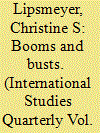

|
|
|
|
|
| Publication |
2011.
|
| Summary/Abstract |
A crowded field of research has focused on the relationship between government ideology and welfare policy. In advancing this work, I refocus the debate on how the economic context can affect the manner in which governments shape welfare spending. In my analyses of social expenditures during times of economic booms and busts, I find that governments in recessions relax their ideological visions, while those in periods of prosperity have the room to make discretionary policy changes. By combining theories of government behavior with assumptions about preferences during diverse economic climates, these findings show how the economic environment affects governments' abilities to implement ideological policies. More importantly, this transcends the extant literature, resulting in a more complete picture of the relationship between politics and welfare policies.
|
|
|
|
|
|
|
|
|
|
|
|
|
|
|
|
| 2 |
ID:
043108


|
|
|
|
|
| Publication |
Paris, Ecole Pratique de hautes Etudes, 1971.
|
| Description |
x, 225p.
|
|
|
|
|
|
|
|
|
|
|
|
Copies: C:1/I:0,R:0,Q:0
Circulation
| Accession# | Call# | Current Location | Status | Policy | Location |
| 011656 | 338.9/UNI 011656 | Main | On Shelf | General | |
|
|
|
|
| 3 |
ID:
132023
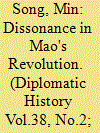

|
|
|
|
|
| Publication |
2014.
|
| Summary/Abstract |
Following President Richard Nixon's visit to China in February 1972, U.S.-China trade increased almost ten-fold within three years, of which China's agricultural imports represented the largest category. This trade created unprecedented opportunities for the Chinese pragmatists to pursue economic modernization, and sharpened the conflict between them and the radicals who adhered to Mao Zedong's ideological crusade. Drawing on both English and Chinese sources, this article examines the fluctuations of China-U.S. agricultural trade between 1972 and 1978. It focuses on the process of trade management in an ideologically charged environment, specifically, the interactions between the pragmatists and radicals under the dominance of Mao. It argues that this trade brought tremendous pressure on the very framework of that Chinese system, tested the boundaries of Mao's revolutionary ideology, and encouraged a fundamental change of course in China.
|
|
|
|
|
|
|
|
|
|
|
|
|
|
|
|
| 4 |
ID:
138588


|
|
|
| 5 |
ID:
087103


|
|
|
|
|
| Publication |
Budapest, Hungarian Scientific Council for World Economy, 1981.
|
| Description |
192p.
|
| Standard Number |
9633010748
|
|
|
|
|
|
|
|
|
|
|
|
Copies: C:1/I:0,R:0,Q:0
Circulation
| Accession# | Call# | Current Location | Status | Policy | Location |
| 020658 | 330.9/DOB 020658 | Main | On Shelf | General | |
|
|
|
|
| 6 |
ID:
105278
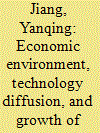

|
|
|
|
|
| Publication |
2011.
|
| Summary/Abstract |
This paper examines the effects of the regional economic environment and technology diffusion on China's regional total factor productivity (TFP) growth. We build a model of TFP growth in which Chinese regions achieve growth in TFP by making use of technology spillovers from the world technology frontier. We hypothesize that given the world frontier level of TFP, China's regional TFP growth is positively related to regional openness and negatively related to the current level of regional TFP. Empirical analysis in this paper of 29 province-level regions in China strongly supports our hypothesis. By using a nonlinear least squares regression method, we show that regional openness has a significantly positive effect on regional TFP growth. As a by-product, we also estimate a value of the output elasticity of capital that conforms to its traditionally accepted values. The findings of this paper lend strong support to the claim that the opening up process of China promotes the country's economic growth.
|
|
|
|
|
|
|
|
|
|
|
|
|
|
|
|
| 7 |
ID:
132603
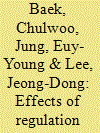

|
|
|
|
|
| Publication |
2014.
|
| Summary/Abstract |
We propose a competitiveness index for the electricity industry based on efficiency, stability, and growth factors identified from previous studies subject to data accessibility. These are then weighted appropriately through the application of the analytical hierarchy process. This index is an alternative tool to capture the diverse characteristics of the electricity industry in order to analyze performance after deregulation. Using the competitiveness index, we analyze the effect of regulation change in specific economic environments represented by the level of economic development, energy intensity, and manufacturing share, for example. According to the results, deregulation generally increases competitiveness, but the effect depends on the economic environment and the type of regulation. Deregulating entry and vertical integration to increase competitiveness is more effective in countries where the level of economic development, energy intensity, and manufacturing share are low. The manner in which the privatization effect is related to the economic environment is, however, unclear.
|
|
|
|
|
|
|
|
|
|
|
|
|
|
|
|
| 8 |
ID:
116147
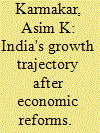

|
|
|
| 9 |
ID:
025716


|
|
|
|
|
| Publication |
Berkeley, University of California Press, 1967.
|
| Description |
xviii, 742p.: figures, tableshbk
|
|
|
|
|
|
|
|
|
|
|
|
Copies: C:1/I:0,R:0,Q:0
Circulation
| Accession# | Call# | Current Location | Status | Policy | Location |
| 001828 | 954.21/WER 001828 | Main | On Shelf | General | |
|
|
|
|
| 10 |
ID:
132693


|
|
|
|
|
| Publication |
2014.
|
| Summary/Abstract |
This study looks at the potential competitiveness of the emerging biomass-based biofuel industry in the current economic environment. A simulation model suggests that a mature biomassbased biofuel industry is potentially competitive with gasoline, and capable of filling a significant fraction of motor fuel supplies. However, the existing land policy has a narrow definition of agricultural land for a biomass-based fuel industry. A broader definition of agricultural land suitable for biomass inputs would reduce biofuel processing costs, relieve the food versus fuel conflict, and increase the net gain to fuel consumers, food consumers, and producers of food and fuel.
|
|
|
|
|
|
|
|
|
|
|
|
|
|
|
|
| 11 |
ID:
119655


|
|
|
|
|
| Publication |
2013.
|
| Summary/Abstract |
Chances are that you will never hear a crowd at a protest rally chant, "What do we need? Regulation! When do we need it? Now!"
People want safe food, clean air, and clean water. But in the abstract, regulation is never a popular idea. In a tough economic environment, it might seem like a recipe for disaster. In the United States, businesses large and small have long argued that they are subject to excessive red tape and government oversight, and in the context of a serious recession, that concern has become acute. In light of the country's general enthusiasm for freedom of choice, regulation is particularly vulnerable to political attack.
|
|
|
|
|
|
|
|
|
|
|
|
|
|
|
|
|
|
|
|
|